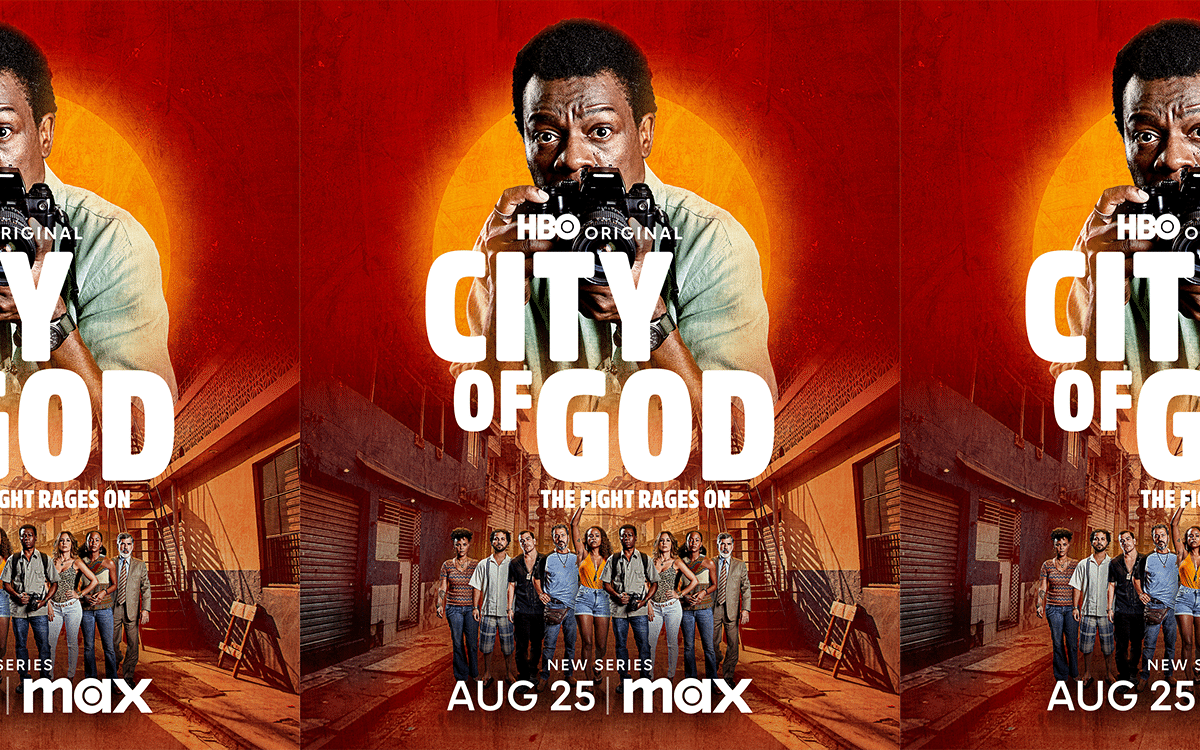Long years have passed since our visit to Rio de Janeiro’s lawless favela in City of God. More than two decades after the iconic Brazilian film’s debut, Max is bringing a sequel series to its catalog, titled City of God: The Fight Rages On. Spanning six episodes, the drama pays homage to the original work while offering a deeply human perspective on the daily struggles of the community’s residents. Produced by O2 Filmes and airing on HBO Latino and Max, the show premieres Sunday, August 25.
The first time I heard about City of God (Cidade de Deus in Portuguese), it was from a professor of investigative journalism. He turned to me and said, “It’s lightning in a bottle. Don’t let the title fool you,” and how right he was. Set in the eponymous favela between the late 1960s and early 1980s, City of God tells the story of the childhood and teen years of several interrelated characters struggling to escape extreme poverty and organized crime.
Directed by Fernando Meirelles with Kátia Lund, and based on the semi-autobiographical novel by Paulo Lins, City of God broke records at the box office in its native country and shortly thereafter hit international markets with great success. For its gritty realism, frenetic pace, and unforgettable characters, it earned numerous accolades, including four Academy Award nominations.
That’s the back story. Now to the series at hand, the City of God: The Fight Rages On.
What is the Plot of City of God: The Fight Rages On?
Produced by Fernando Meirelles and Andrea Barata and directed by Aly Muritiba, the HBO series continues the narrative thread of the original story. Once again, the story unfolds through the eyes of the tenacious photojournalist “Rocket,” who brings us back to the favela and makes sense of this labyrinthine social reality.
We are in the early 2000s, and City of God is no longer the same corrupt and abandoned territory. These days, it is a place of contrasts that resists oversimplification. Although poverty and crime persist, the series also shows the hope and resilience of the community that does its best to live in dignity. Whether through sports or art, we see the people who live there trying to make it better.
As a rule, though, there is not much room for peace in Rio de Janeiro’s favelas. Things quickly heat up when impulsive drug dealer Bradock (Thiago Martins) is released from prison and seeks to reclaim his former place in the slum’s criminal network. What follows is a brutal turf war against the charismatic and fearsome Genivaldo Curió (Marcos Palmeira). Like Meirelles’ film, the sequel series shows how the struggles to control territory often result in a spiral of bloodshed.
Although the production focuses on the tumultuous world of drug trafficking and the advance of militias, City of God: The Fight Rages On has a real interest in small personal and community stories. Beyond the bullets, the drama allows us to get closer to the “daily life” of the families that inhabit the favelas and explore their aspirations and hopes. Fernando Meirelles told Collider, the film City of God “talked about the shortcomings of the communities. This time, it’s going to be about the power of those communities.”
Which Characters Are Returning for the Sequel?
Lead performer Alexandre Rodrigues, is back and in top form as photographer Wilson “Rocket.” The Brazilian is comfortable reprising his starring role, and his voiceover guides the tale. City of God: The Fight Rages On also picks up the story of Barbantinho (Edson Oliveira), Rocket’s steadfast friend who aspires to be a councilman. Joining him are Cinthia (Sabrina Rosa), the coordinator of the favela’s cultural movement and Berenice (Roberta Rodrigues), the community activist who wants to make changes from within. Also returning are the menacing figures of Bradock (Thiago Martins), the rabid drug dealer behind the gang war and Melonhead (Kiko Marques), the Secretary of Public Safety who once wore a badge and scourged the City of God.
They are accompanied by some great additions, such as Leka (Luellem de Castro), Rocket’s daring daughter hungry for a musical dream, Jerusa (Andréia Horta), the lawyer given to chaos and hidden agendas, and Lígia (Eli Ferreira), a journalistic force bent on exposing the City of God’s criminal network. As expected, the series does not take flight without first altering the lives of all those involved.
Does City of God: The Fight Rages Live Up to the Movie?
City of God: The Fight Rages On has much of the explosive charm that drew audiences more than 20 years ago. From the soccer fields to the violent brawls, the return to the favela remains exhilarating and visceral.
Max’s latest offering doesn’t forget where it comes from. Right from the opening sequence, with the camera in full swing through the streets of Rio, director Aly Muritiba’s narrative skill is beyond question. Each of his shots emanates the colors, smells, and sounds of Brazil’s tough neighborhoods and captures the essence of the predecessor project. Another notable plus is that the series, like the film, traces its characters with strong, colorful brushstrokes.
While the sequel series doesn’t feel as powerful as the classic 2002 film, City of God: The Fight Rages On makes a clear effort to match the furious, enveloping energy of the original work and is certainly worth a watch.

